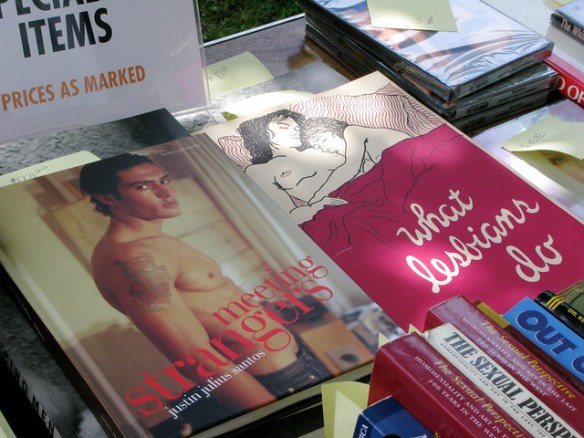 A book-sale table at Twin Cities Pride 2013. I bought some books at the sale—but not any of these. Photo by jby.
A book-sale table at Twin Cities Pride 2013. I bought some books at the sale—but not any of these. Photo by jby.I read 17 books in 2013. I actually have no idea how this stacks up to past years, though I did set myself the goal of 20, and that proved to be a bit ambitious. Here’s the list, more or less in chronological order, with notes about what I thought of each:
- Cloud Atlas, David Mitchell — I read this after watching the film adaptation, and came away with a deeper appreciation for both versions of the layered, multi-generational story. As a book, it’s an endless pleasure of renewed recognition as themes and images repeat and evolve.
- 2312, Kim Stanley Robinson — This is a really lovely, optimistic vision of humanity’s future. It has some great set-piece scenes, including one in which space-dwelling communities drop animals from orbit to repopulate the Earth’s biosphere. The actual plot—something about politics across the Solar System—is rather thin, and mostly happens in the background, but 2013 is grade-A hard science fiction with a humanist soul.
- Children of the Sky, Vernor Vinge — A nice continuation of the series started with A Fire Upon the Deep, which explores a society reshaped by the arrival of aliens (humans!) bearing hyper-advanced technology. Unfortunately it’s a little less self-contained than the earlier books, leaving a number of plot threads loose in anticipation of a sequel.
- Sticks and Stones, Emily Bazelon — I wrote a full-length review for this one—I think it’s a great and important collection of research.
- On Being Different: What it Means to Be Homosexual, Merle Miller — This was a self-assigned reading in what I think of as my ongoing class in remedial Queer Studies, and it’s remarkable both for how much has changed since Miller first wrote the essay, just a couple years after Stonewall, and how much really hasn’t.
- Making Scientists: Six Principles for Effective Science Teaching, Gregory Light and Marina Micari — I reviewed this for ProfHacker. Coming from the perspective of someone who wants ideas about what to actually do in a classroom, rather than general statements of principle, I didn’t find it very helpful.
- Matter, Iain M. Banks — Banks (who died this year, unfortunately) is my current go-to for solid, exciting space opera that doesn’t require me to stop thinking critically when I pick it up. Matter describes the interactions of a primitive culture with much more advanced ones—and the deadly outcomes of political maneuvering within each.
- Zoe’s Tale, John Scalzi — More space opera, this time about human colonists on a new world and their efforts to avoid war with non-human intelligent natives, and hostile off-world aliens. Like Orson Scott Card’s Speaker for the Dead without any of the mystical fluff or weird sexual baggage.
- Relentless Evolution, John N. Thompson — I reviewed this for The Molecular Ecologist, and I liked it quite a lot.
- The Second American Revolution and Other Essays, 1976-1982, Gore Vidal — I’m ashamed to admit this was my first in-depth exposure to Vidal. He’s a bit classist for my taste, but at his catty best, he’s great. This got me wanting to write essays.
- The Algebraist, Iain M. Banks — Another solid hit, this one a story of interstellar war in which ancient and apparently gormless, anarchic aliens turn out to be more than they seem.
- Life at the Speed of Light, J. Craig Venter — I reviewed this for The Molecular Ecologist, and thought it was pretty good.
- Paleofantasy, Marlene Zuk — This is a lively debunking of some recent pseudo-scientific fads, and a nice introduction to better-supported thinking about recent human evolution.
- The Murder Room, P.D. James — The first old-school mystery novel I’ve picked up in ages. It’s a good, straightforward murder procedural.
- Fun Home, Alison Bechtel — This graphic novel-format autobiography about Bechtel’s childhood with her closeted father may be the best thing I read all year. I blew through it in two evenings of sitting up late.
- The Green Hills of Earth, Robert Heinlein — This was my first in-depth exposure to Heinlein (I never did make it through Starship Troopers), and I mostly liked it. Green Hills is really a collection of short stories, set over the course of humanity’s expansion across the Solar System. I like Heinlein’s focus on (mostly) men doing the grunt work of colonization, though his writing is workmanlike at best, and definitely a product of its time.
- A Dance With Dragons, George R.R. Martin — I waited for this one until it came out in mass-market paperback, both because I’m a cheapskate and because I know I’ll have a long wait for the next book in the series. Like every entry in Martin’s “Song of Fire and Ice” since the first A Game of Thrones, this isn’t a particularly self-contained story, but it’s a good continuation, and it made for good holiday-break reading.
◼
